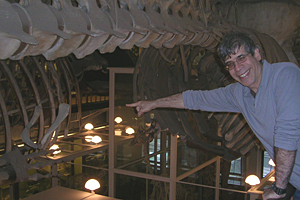![[Chronicle]](/images/sidebar_header_oct06.gif)
Vol. 27 No. 3
current issue
archive / search
contact
Past Opine interviews:
Lauren Berlant
Stephen Berry
John Boyer
David Cohen
Jerry Coyne
John Cunningham
Richard Epstein
John Frederick
Henry Frisch
Austan Goolsbee
Bernard Harcourt
Greg Jackson
Martin Marty
Martha Nussbaum
Raymond Pierrehumbert
José Quintáns
Jan-Marino Ramirez
Saskia Sassen
William Sewell
Herman Sinaiko
Geoffrey Stone
Cass Sunstein
Simon Swordy
Opine: Jerry Coyne
 Jerry Coyne, Professor in Ecology & Evolution and the College, points to the vestigial pelvis and hind-limb bones of a sperm whale (Physeter catodon) on display at the Museum of Comparative Zoology at Harvard University. Because the bones are remnants of the hind limb structure of the whale’s four-legged ancestor and no longer of use, they provide evidence of evolution. | |
What book should everyone read and why?
On the Origin of Species by Charles Darwin. More than any other work of science, it changed human consciousness, revealing not only that we’re not the center of the universe, but also that we’re kin to all living organisms, having evolved by the same blind processes that produced every other species. The way Darwin musters disparate evidence in support of evolution and natural selection (he called the book “one long argument”) is breathtaking. It’s the one science book that must be read by anyone who claims to be educated.
What American citizen, who is a well-known public figure, is a role model for America's younger generation? What qualities does this individual possess that are worthy of being emulated?
Jimmy Carter. Unlike other Presidents, who spend their retirement building their libraries, playing golf or swelling their coffers, Carter has devoted himself to making peace and helping the less fortunate. He’s the model of what an ex-President should be.
What advice would you give to your best student who plans to follow a similar career path you have followed in teaching and doing research?
Don’t put your name on your students’ papers or engage in gratuitous authorships to further your own career.
How has information technology changed your life?
It’s enormously facilitated research by making the sharing of scientific information much faster and access to the literature much easier. The introduction of online journals is a tremendous boon to everyone.
Think of a renowned scholar from the past who added great value to your area of study. What would this person think of the advances that recently have been made in this field?
Darwin, of course, for he started the field of evolutionary biology, and we’re still working on problems he adumbrated in 1859. I think he’d be enormously pleased at all the evidence for evolution (especially in the fossil record) that has accumulated in the last century. He’d also be astounded at advances in genetics (which didn’t exist as a science while he was alive), and at DNA sequencing that enables us to reconstruct the ancestry of nearly everything. And I hope he’d be pleased with my own work on speciation, which is a problem that he introduced (On the Origin of Species) but didn’t solve.
What lesson or lessons has America not yet learned from its history?
Don’t invade a country without a very good reason, especially if it hasn’t attacked you first.
In your opinion, where do science and art meet?
They’re both attempts to understand and explain the world: science the external world and art the internal one.
What are the three most important things to apply when making an argument for something you believe in (e.g., academic freedom)?
Absolute honesty, an attempt to understand the other person’s views, and sanguinity.
If you could choose any three University professors and give them a one-year sabbatical together to solve a problem, develop a theory or make a discovery, who would they be and what task would you assign them?
I’m assuming you mean professors at this school. I would choose myself, Rick Rosengarten from the Divinity School and Bob Richards from Philosophy and History. We’d go to the Rockefeller Foundation’s Villa Serbelloni in Bellagio, Italy (a paradise on earth for scholars), and work on whether there is any way to reconcile science and religion.